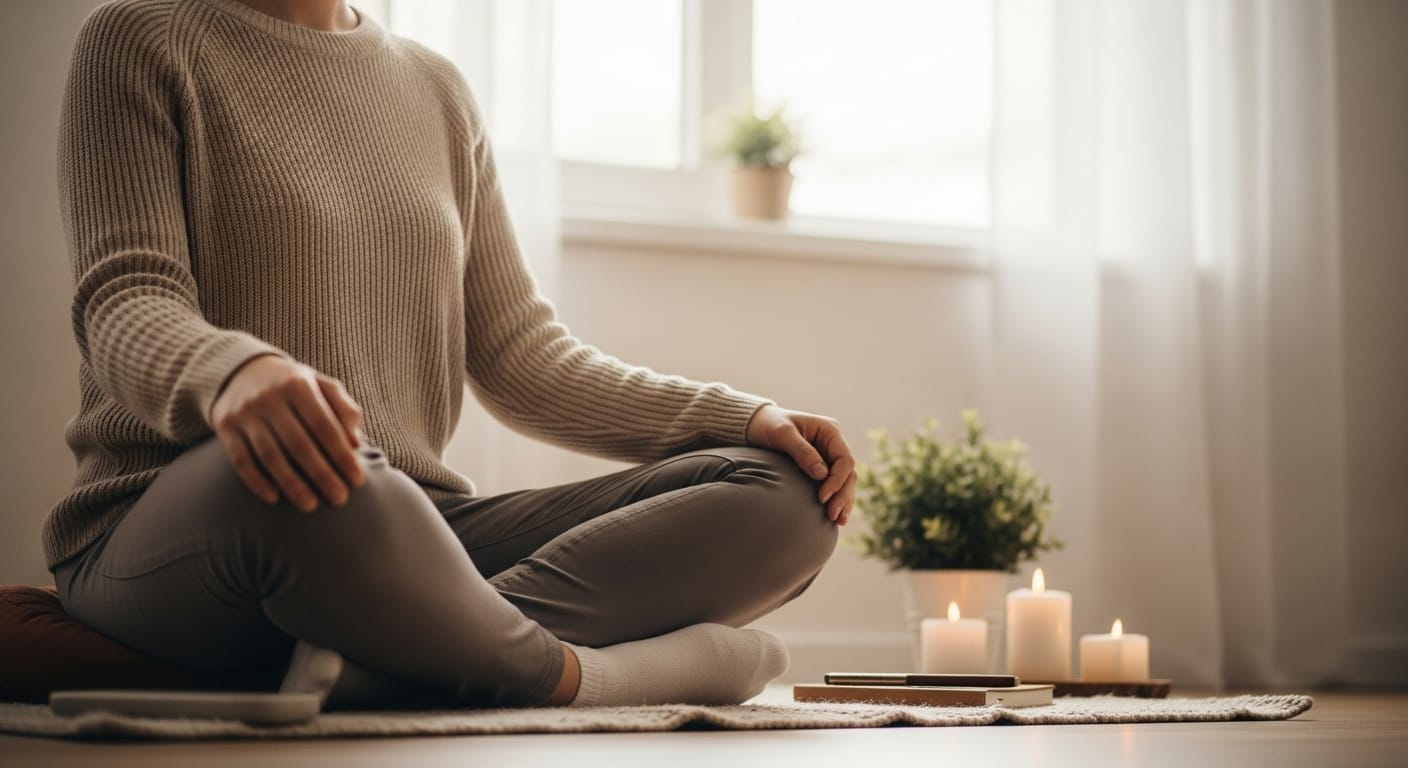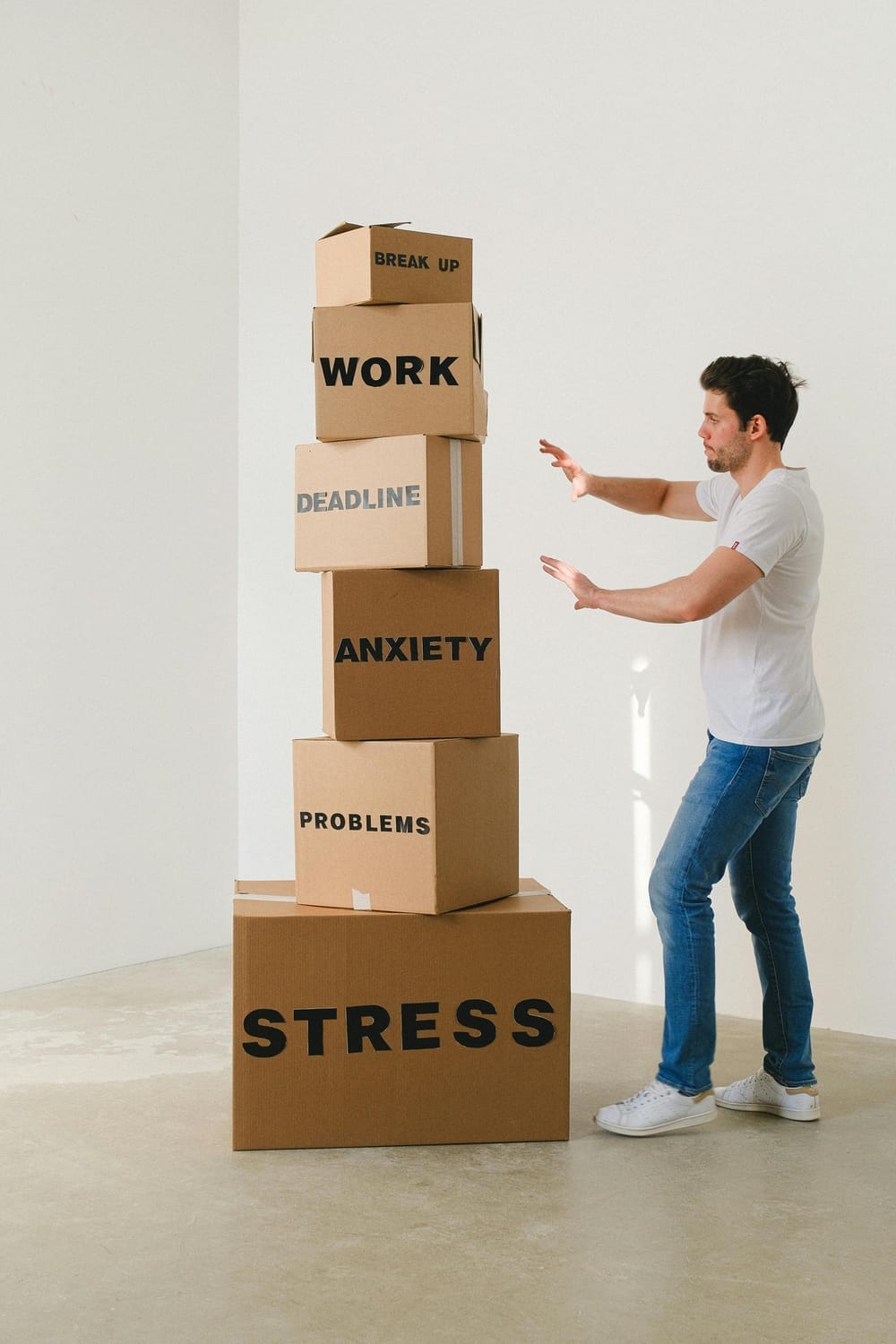

Mindful
Meditation
Unlocked
"Quiet the Mind. Unlock the
Present. Discover Mindfulness
That Transforms."
Overcome Anxiety with These Simple Techniques
Feeling overwhelmed by anxiety is common. Many people face this issue. But, there are ways to manage it effectively. This article will show you simple methods for anxiety relief and better well-being.
Learning to manage anxiety can help you take back control. You'll feel calmer and more centered. We'll share easy tips and methods to add to your daily life.
Key Takeaways
Discover simple techniques to manage anxiety
Learn effective strategies for achieving anxiety relief
Understand the importance of anxiety management
Explore practical tips for reducing anxiety
Improve your overall well-being with these techniques
Understanding Anxiety and Its Impact
It's important to understand anxiety to manage its effects on our daily lives. Anxiety is a common feeling that can show up in different ways. It can affect our physical and emotional health.
Common Physical and Emotional Symptoms
Anxiety can cause symptoms like a fast heartbeat, sweating, and shaking. It can also make us feel scared, worried, and irritable. Spotting these anxiety symptoms is the first step in coping with anxiety.
The Difference Between Normal Worry and Anxiety Disorders
Worrying is normal, but anxiety disorders are different. They involve too much fear or worry that gets in the way of daily life. Knowing this difference helps in effective anxiety management.
How Anxiety Affects Daily Functioning
Anxiety can really impact our daily lives. It can affect our work, relationships, and overall happiness. By understanding how anxiety affects us, we can start to find ways to manage it.
Quick Physical Techniques for Immediate Anxiety Relief
Finding instant calm is possible with simple yet effective physical techniques designed to reduce anxiety. These methods can be employed anywhere, providing immediate relief from the grip of anxiety.
Deep Breathing Exercises
Deep breathing is a powerful tool for calming the mind and body. By focusing on your breath, you can slow down your heart rate and reduce feelings of anxiety.
4-7-8 Breathing Technique
The 4-7-8 breathing technique, also known as the "relaxation breath," involves breathing in through your nose for a count of 4, holding your breath for 7, and exhaling through your mouth for 8. This technique can help slow down your heart rate and promote relaxation.
Box Breathing Method
Box breathing involves breathing in for 4 seconds, holding for 4 seconds, exhaling for 4 seconds, and holding again for 4 seconds. This creates a "box" shape with your breath, promoting balance and calm.
Progressive Muscle Relaxation
Progressive muscle relaxation involves tensing and relaxing different muscle groups in your body. Start with your toes and work your way up to your head, holding the tension for a few seconds before releasing. This technique helps release physical tension associated with anxiety.
5-4-3-2-1 Grounding Technique for Panic Attacks
The 5-4-3-2-1 grounding technique is a simple yet effective method for managing panic attacks. It involves noticing:
5 things you can see
4 things you can touch
3 things you can hear
2 things you can smell
1 thing you can taste
This technique helps ground you in the present moment, distracting you from feelings of anxiety.
| Technique | Description | Benefits |
|---|---|---|
| 4-7-8 Breathing | Breathe in for 4, hold for 7, exhale for 8 | Slows heart rate, promotes relaxation |
| Box Breathing | Breathe in, hold, exhale, hold for 4 seconds each | Promotes balance, calms the mind |
| Progressive Muscle Relaxation | Tense and relax muscle groups | Releases physical tension |
| 5-4-3-2-1 Grounding | Notice 5 things seen, 4 touched, 3 heard, 2 smelled, 1 tasted | Grounds you in the present, reduces panic |
Cognitive Strategies: How to Reduce Anxiety Through Thought Management

Cognitive strategies are key in managing anxiety by changing how we think. By controlling our thoughts, we can lower our anxiety levels.
Identifying and Challenging Cognitive Distortions
Managing anxiety starts with spotting and fighting cognitive distortions. These are thoughts that are not true or are too big. Knowing them helps us change them to more realistic thoughts.
Mindfulness and Present-Moment Awareness
Mindfulness is about being fully in the now, without judging. It helps by taking our mind off worries about the past or future. Regular mindfulness makes us more aware of the present, lowering anxiety.
Worry Time: Scheduling Your Anxious Thoughts
Setting a "worry time" is a good way to manage anxiety. It lets you worry only during a certain time, keeping it from interrupting your day.
Positive Self-Talk and Affirmations
Positive self-talk and affirmations fight off negative thoughts that cause anxiety. By saying positive things to ourselves, we build a more positive outlook and lower anxiety.
| Cognitive Strategy | Description | Benefits |
|---|---|---|
| Identifying and Challenging Cognitive Distortions | Becoming aware of and challenging irrational thought patterns | Reduces irrational thoughts contributing to anxiety |
| Mindfulness and Present-Moment Awareness | Focusing on the present moment without judgment | Decreases worries about the past or future |
| Worry Time | Scheduling a specific time to worry | Contains anxious thoughts to a specific time, reducing intrusion into daily activities |
| Positive Self-Talk and Affirmations | Using positive statements to counteract negative thoughts | Cultivates a positive mindset, reducing anxiety |
Lifestyle Changes That Help Manage Anxiety

Managing anxiety often means making big changes in your life. Adding a few simple habits to your day can lower your anxiety and boost your mood.
The Role of Regular Exercise in Anxiety Reduction
Exercise is a great way to fight anxiety. It releases endorphins, which are like natural happiness pills. You don't have to run marathons; just a short walk or some stretching can help.
Sleep Hygiene Practices for Better Mental Health
Good sleep is key to managing anxiety. Stick to a sleep schedule, avoid caffeine and screens before bed, and have a calming bedtime routine. This can make your sleep better.
Nutrition, Hydration, and Substances to Avoid
Eating right and staying hydrated are vital for your mental health. Cut down on caffeine and sugar, and eat less processed food. Drinking lots of water is also important.
Creating Boundaries with Technology and Social Media
Today, it's easy to get lost in social media and digital info. Setting limits, like reducing screen time or taking a break from digital, can help you feel less stressed and anxious.
By making these lifestyle changes, you can actively manage your anxiety and enhance your life's quality.
Building Your Support System
Creating a strong support network can greatly help you deal with anxiety. Having people you trust who get what you're going through is key. They offer comfort, guidance, and a sense of belonging, all important for managing anxiety.
Communicating Your Needs to Friends and Family
Telling your friends and family about your needs is vital. Let them know how they can help, like listening, doing tasks, or just being there. Being open about your anxiety can make you feel less alone and strengthen your bonds.
Finding Community Support Groups
Joining a support group can be really helpful. These groups are safe places to share your story, learn from others, and get tips on managing anxiety. Look for groups that fit your needs and preferences, whether online or local.
Digital Tools and Apps for Anxiety Management
Today, there are many digital tools and apps for anxiety. From mindfulness apps to mood journals, they offer extra support and guidance. Try out different ones to see what works best for you.
Building a strong support system is key to managing anxiety. It helps you get through tough times. Remember, managing anxiety is a journey, and the right support can make a big difference.
Creating a Personalized Anxiety Management Plan
You can take control of your anxiety by making a plan just for you. This means knowing what you need and finding ways to meet those needs.
Identifying Your Specific Anxiety Triggers
Knowing what makes you anxious is key. Keep a journal or log to track when and why you feel anxious. This helps you spot patterns and common causes.
Building a Toolbox of Coping Strategies
It's important to have many ways to cope. Try deep breathing exercises, progressive muscle relaxation, and mindfulness practices. See which ones work best for you.
Deep Breathing Exercises
Progressive Muscle Relaxation
Mindfulness and Meditation
Physical Exercise
Setting Realistic Goals for Recovery
Setting goals that you can reach is important. Break big goals into smaller steps. Celebrate each success to keep you going.
Tracking Your Progress and Celebrating Small Wins
Keep track of how you're doing. Use a journal or app to monitor your progress. Celebrate small victories to encourage good habits.
By following these steps, you can make a plan that helps you manage anxiety well.
Conclusion: Your Journey to Overcoming Anxiety
Remember, overcoming anxiety is a journey that takes time and effort. By using techniques like deep breathing and changing your lifestyle, you can manage anxiety better. These steps help you find ways to cope with anxiety.
Understanding what triggers your anxiety and building a support system are key. Creating a plan to manage your anxiety is also important. Tracking your progress and celebrating small victories keeps you motivated. This helps you reduce anxiety and feel better overall.
Be kind to yourself and know that setbacks happen. Keep working towards your goals and ask for help when you need it. With time and practice, you'll learn to handle anxiety and enjoy a more fulfilling life.
FAQ
What are some simple techniques to reduce anxiety?
Simple ways to reduce anxiety include deep breathing and progressive muscle relaxation. The 5-4-3-2-1 grounding technique is also helpful. Cognitive strategies like mindfulness and positive self-talk can also manage anxiety well.
How can I manage anxiety in my daily life?
To manage anxiety daily, try regular exercise and good sleep habits. Eating well and setting limits on tech use are also key. Building a support network and making a personal anxiety plan can help too.
What is the difference between normal worry and anxiety disorders?
Normal worry is common, but anxiety disorders are more intense and disrupt daily life. They can affect your body, mind, and emotions. Getting professional help is often needed to manage them.
How can I identify my specific anxiety triggers?
To find your anxiety triggers, reflect on when you feel anxious. Keeping a journal can help spot patterns. This way, you can better understand what causes your anxiety.
Are there any digital tools or apps that can help with anxiety management?
Yes, many digital tools and apps can help manage anxiety. There are apps for mindfulness, mood tracking, and cognitive-behavioral therapy. These can offer extra support and resources.
How can I communicate my needs to friends and family regarding my anxiety?
To share your anxiety needs, be open and clear about how it affects you. Explain what support you need from them. This can strengthen your relationships and support system.
What are some effective ways to track progress in anxiety management?
Tracking your anxiety progress can be done through journaling or mood apps. Setting and celebrating small goals is also helpful. Regularly reviewing your plan can show how far you've come.
Stay Mindful
Get updates & free mental wellness tips.
Hi 👋
Hope you are doing okay, Just want to let you know,
Some links on this site are affiliate links. We may earn a small commission if you make a purchase — at no extra cost to you.
Understand Your Mind.
Try our quick quizzes to learn more about your mental health.
Check these out









